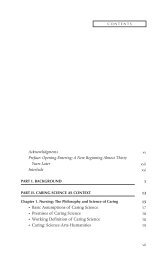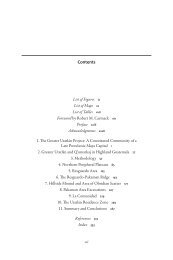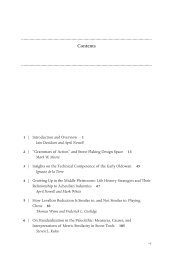free download - University Press of Colorado
free download - University Press of Colorado
free download - University Press of Colorado
You also want an ePaper? Increase the reach of your titles
YUMPU automatically turns print PDFs into web optimized ePapers that Google loves.
Daniel H. Sandweiss and Jeffrey Quilter<br />
but it is actually highly efficient and technologically sophisticated—as in the<br />
case <strong>of</strong> compound tools that, in Swiss Army knife fashion, provide multiple<br />
working edges and surfaces in a single, light, portable instrument (Gould<br />
1970). Furthermore, while Aboriginal technology might be considered simple,<br />
Western Desert kinship systems are among the world’s most complex. Because<br />
it was important to them, Western Desert Aborigines easily kept track <strong>of</strong> marriage<br />
rules and clan affiliations that can boggle the mind <strong>of</strong> an outsider. Finally,<br />
both the technology and the social system <strong>of</strong> the Western Desert Aborigines<br />
were potentially the products <strong>of</strong> the same number <strong>of</strong> centuries as Western<br />
European or East Asian systems, so they cannot be assumed to be some kind <strong>of</strong><br />
relicts from the past.<br />
At the same time we can recognize that ethnographically known, apparently<br />
simple societies are not so simple and that they are not fossils <strong>of</strong> a distant past,<br />
we are faced with the demonstrated fact that, in broad view, human life on<br />
the planet has gone through dramatic changes since the Lower Paleolithic, as<br />
Timothy Kohler states so elegantly in his chapter in this volume. Long ago,<br />
V. Gordon Childe (1925) emphasized the Neolithic, Urban, and Industrial<br />
Revolutions; since then, other scholars have noted additional dramatic<br />
changes, such as the Broad Spectrum Revolution (Flannery 1969), among others.<br />
However many revolutions one wishes to cite, the underlying fact <strong>of</strong> the<br />
matter is that 30,000 or 40,000 years ago, all humans were hunter- gatherers.<br />
Through time, the number <strong>of</strong> hunter-gatherers has diminished while the number<br />
<strong>of</strong> agriculturalists has grown, and, increasingly, more people are living<br />
in urban centers and are not directly involved with food production. These<br />
changes have been accompanied by a great number <strong>of</strong> others, such as increased<br />
dependence on fossil fuels and the machinery that runs on them and, more<br />
recently, on computer technology. All <strong>of</strong> these changes and more have occurred<br />
on an increasingly global scale, so even people who do not have many machines<br />
or computers are affected by them.<br />
These global changes can be referred to as increasing “complexity” in the<br />
sense that Emile Durkheim (1984 [1893]) proposed that societies consist <strong>of</strong><br />
increasingly specialized subunits that interrelate in complex ways. Recently,<br />
Ian Hodder (2006) has referred to the increasing “entanglements” people have<br />
with material culture, including such things as infrastructure, on which people<br />
become dependent and which consequently traps them in systems <strong>of</strong> dependency.<br />
For Peru, this trend is clear in the change from early gathering-fishinghunting<br />
communities that had low investments in complex infrastructure and<br />
so could adapt to changing circumstances, such as the dramatic changes in<br />
resource availability and locations during El Niño events and the increasing<br />
complexity and entanglements that occurred with the growth in dependence<br />
on irrigation agriculture, urban settlements, and the associated socio-political<br />
and economic systems that were tied to them.<br />
124





